On Mandela Day: things that shaped this South African
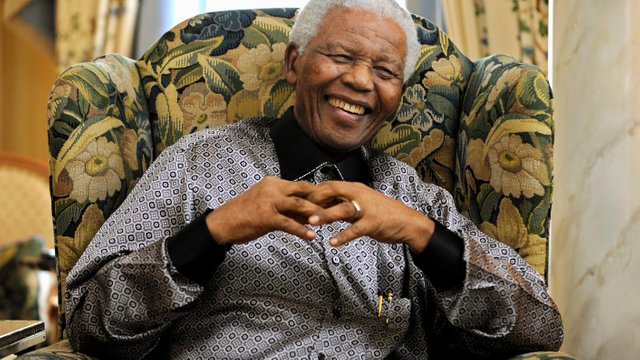
Today we celebrate the one-hundredth anniversary of Nelson Mandela's birth. As I reflect on this I reflect on my own journey, and three books I have read over the last three or so years. The most recent is by someone who recently moved to our viillage and who, like me, is the daughter of British immigrants and herself an immigrant having arrived in South Africa as a young child. As did I. There is a third parallel: she is an alumn of my alma mater. She, however, was there more than a decade after I. It was there that she voted in South Africa's first democratic election.
That is where the parallel ends. She grew up in suburban Gauteng (then known as the Transvaal); in a mining town. I grew up, once my parents settled, in that small university town in the Eastern Cape: Grahamstown. The era, and I use that word advisedly, in which she grew up, i.e. her teenage years, is known in struggle circles as the "height of the total onslaught" of the ANC by the National Party government: the 1980's.
Before I get to that, a little about my childhood: as I have mentioned, my father was a horticulturist. My mother started her adult working life as a nurse. She trained in Oxford, England, in the hospital where I was born, before moving to a famous children's hospital in London.
Why do I mention this?
Because she had to give up nursing: her bunions were so bad she could not be on her feet for long hours. In her mid-20's she had to find a new career. In the 1940's, that was not to be sneezed at when women were expected to marry and not work. More to the point, though, she had chosen nursing as the next best thing to her first career choice: medical doctor.
How the parents met and married doesn't matter for the moment, but what is significant is that our family came to South Africa under what I now consider to be rather ironic circumstances. They were compelled to leave Uganda in 1962 not just because my mother was pregnant, and their colonial contracts had come to an end, but because of the "Africanisation" process. There was no resentment or bitterness. Contracts ended; it was time to move on. The sadness was leaving Africa.
Returning to Africa was a direct consequence of a Verwoerd-sponsored campaign to recruit white, male blue collar workers. My father got a job in the parks department with the Port Elizabeth municipality. We arrived in the city, by train, on the 4th of September, a public holiday known as Settlers Day. Two days later, Verwoerd was assassinated. The latter event did not make much impact on the Cameron household. Settlers Day did. When my father enquired as to why the 4th had been a public holiday, he was asked, "Don't you know what happened in 1820?"
My father being a Scot and with an answer for most things, thought on his feet, "Of course, it was the year Johnny Walker was born!"
That was not the answer the taxi-driver expected, and who vehemently disabused him of the importance of Johnny Walker in contrast with the seminal event of the landing of the 1820 Settlers in Algoa Bay.
I grew up in a household where children were to be seen and not heard, and everyone was to be respected equally. We were to obey the family domestic worker and if we didn't, she was detailed to mete out the appropriate punishment. Once we moved to Grahamstown, we had the privilege of the biggest garden imaginable - the botanical gardens. Each one of the workers was a surrogate father. We could not have been safer. Our parents knew that we would be cared for if we strayed too far from the house. We did, often, and yes, we were often despatched back home. I did not know that it was not permitted to squat down in the dirt next to a black man and ask him to show me how to clip grass, let alone, to tell me stories. Nor was I ever told not to do it.
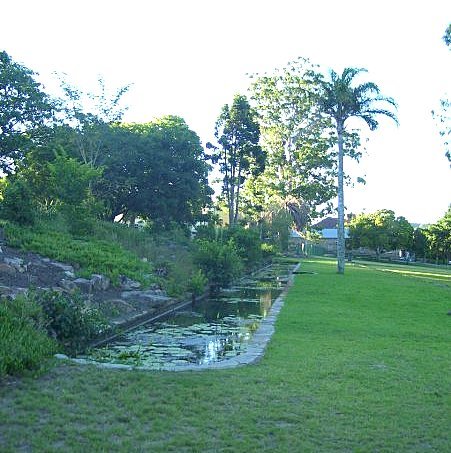
I used to catch tadpoles in this pond.
Some of those men remained in touch with our family for years after they and my father retired. One returned every year, until he was too frail and ill, with his horse and cart, to wish the family for Christmas and to present us with a (live) chicken.
I now realise that my childhood was very different from some South Africans. I did have a little taste of the "other" South Africa when I was at boarding school, but it didn't really penetrate. I lived much in my own world and remember not understanding why we were taught, in urban geography, about the buffer zones. Between the townships of people of different race groups.
The truth crept up on me as I studied and learned at university. A liberal university where, in my naivete, I thought real democracy was not being forced to be part of any organisation, but to remain independent of other politicised student organisations. I was drawn into student politics because I appeared to be quiet, conservative and happy to tow the line. With hindsight, I had a very, very lucky escape even though part of that escape was facilitated by a very nasty car accident that paralysed me for a while. It kept me in hospital for three weeks and off campus for the rest of the term and certainly out of any real action for six months.
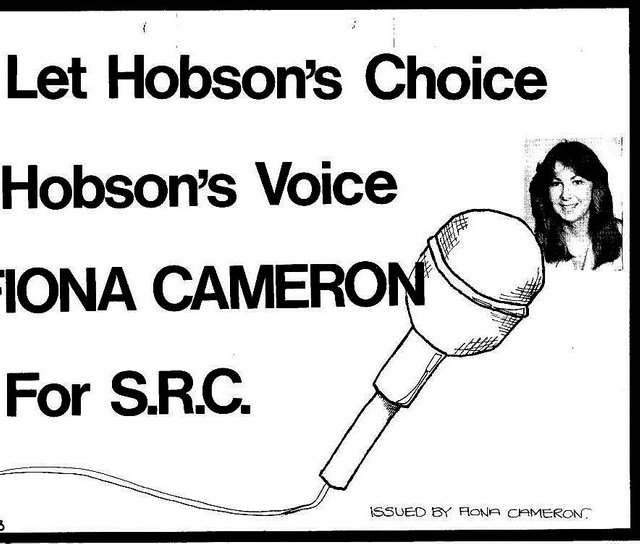
Very original slogan. My constituency: Hobson Hall.
Nobody bothered to ask what I really felt or believed and suddenly I was sucked into things that I did not want to be a part of, let alone be associated with. I was approached to start a conservative student organisation on campus by the then president of the SRC from another liberal university. He ended up being someone who became a leading light in South African intelligence, and from an organisation funded by the South African government. We suspected all this at the time, but there was no proof. That car accident meant an abrupt but merciful end to his (and others') badgering.
I discovered after I left university, that the person who asked me to run for election, was a member of the special branch of the police. How did I discover it? I was living in Johannesburg and was on my way home, through Hillbrow late one evening, and saw him herding people into a police van. I will never forget either the incident or his behaviour. My stomach still turns as I remember this.
How nearly was I drawn into the pervasive apartheid machine.
Now let me return to the books. The other two were written by contemporaries from university who, at the time, were seemingly on the other side of "my" fence. One was on the same SRC as I; the other was the editor of the student newspaper. One, it emerged, four years later, in the mid-80's had betrayed everyone: she had been sent to Rhodes as a spy. I recall the newspaper coverage of her escape from the ANC's prison camp at Quattro. My colleague at the time, Flo Duncan, a frequent visitor to Nelson Mandela when he was on the run, and one of the many women who had served time in the Barberton prison in the 60's, convicted under the Suppression of Communism Act, had understood my horror. In 1987, twenty-three years later Flo was still barred from international travel. Olivia's 2015 "act of contrition", and which I read with great interest, reflects many of the realities of the time, but the defence of her complicity is indefensible. I listened to this interview, before I read the book. Her voice on the radio as clear as the memory of her face sitting opposite me during endless debates and meetings; as vivid as they had been thirty-two years previously. My visceral reaction to the individual whom I had not trusted then, was just as the same. Neither that interview, nor my reading of the book, did anything to change that.
The third and final book, on the other hand, Bridget Hilton-Barber's Student, Comrade, Prisoner, Spy, published a year after Agent 407, is another story. For all the reasons I've mentioned, and mainly because I was a mouse, I was never more than a nodding acquaintance with Bridget. I do remember her as a funny, vivacious and somewhat intimidating human being. Probably because she had all the confidence and joi de vivre I did not. I did know that she'd been in detention; I did know that she worked hard for the cause as did her brothers. All this happened after I had been able to leave active student politics.
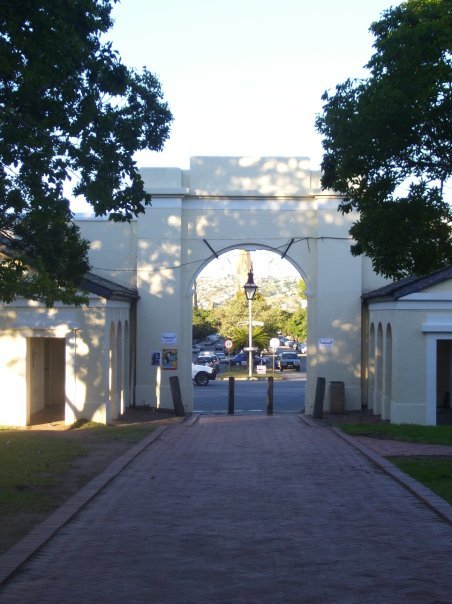
The Drostdy Arch: the site of many a student protest against apartheid
Both books brought memories flooding back of people, places and things. Good, bad and plain evil. What separates the two, profoundly, is that Bridget's is honest, often gut-wrenching and believable. Forsythe's is not.
In the years after university, and all my adult life, except for a short spell in the mining industry, I worked for, or volunteered with, organisations that diametrically opposed to everything the National Party government stood for. The places I frequented were cosmopolitan; we had the best parties in Yeoville, Soweto and in the heart of Johannesburg. We were fun-loving, life-loving young people who wanted a better future for everyone.
So returning to C L Bell's Lost Where We Belong, which I read with interest after going to its launch, and where she read some excerpts: she articulates - very well - her black paranoia and discomfort in South Africa following the euphoria of that first democratic election. She recounts the terror that surrounded her as she grew up. The same years that I wandered the streets of Hillbrow and Yeoville - alone - and when I spent time in Soweto, often the only white woman. A young person in my early 20's and when our phones (landlines only) were bugged and our friends were hounded off the buses - because they were black - and shouldn't have been riding with their white compatriots, let alone stopping on the way home to enjoy a beer! She left South Africa after university in the 90's and returned as a journalist on an assignment for an international funder of human rights issues and research. Some of her experience on this project is recounted in the book, including how her terror re-emerges when she encounters a naked black man taking a healing bath in a stream. I was confused. I am confused. This, from someone who, as a young adult, like me, had fraternised with people of all races. And with much greater freedom - literally - than I could have dreamed of in the seminal years of my early 20s. I was not alone in that confusion. Also at that launch were two other women who had also been at Rhodes, albeit in the years between C L Bell and I.
So, as I reflect on the years leading up to Madiba's release in 1990 and the contribution that Nelson Mandela made to this country, I realise how privileged I was. My parents taught me respect for all humanity even though the other, more conservative elements of my childhood (and my personality) meant that my naivete, lack of confidence and stupidity, prevented me participating in activities at university that might have made a real difference.
So, although we have a long way to go after Zuma's corruption and state capture projects, I am as optimistic about this country as I was in 1994. The irony of my short time in the mining industry is that it introduced me to Cyril Ramaphosa. We were both young and idealistic then. He was Madiba's chosen successor. Nelson Mandela is watching over him and our country and I can only but believe that on the one-hundredth anniversary of his birth, he too, believes that this is a time of renewal and rebirth (with all the attendant trauma) for our country.
Enkosi Tata
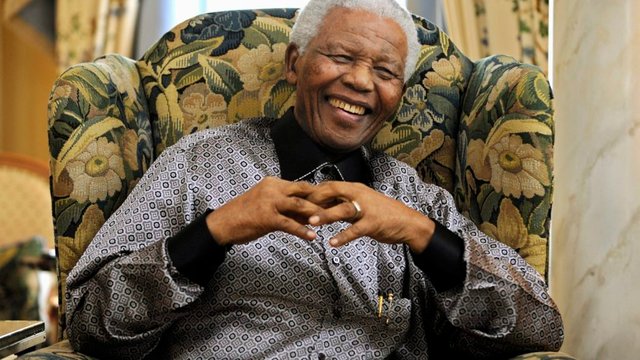
Photo: Daily Maverick
Posted from my blog with SteemPress : http://fionasfavourites.vornix.blog/2018/07/18/on-mandela-day-things-that-shaped-this-south-african/

Join us @steemitbloggers
Animation By @zord189
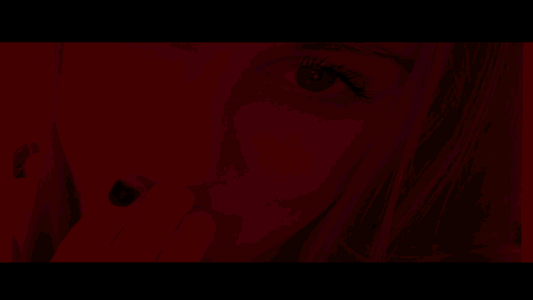
This post is sponsored by @SteemitBloggers in collaboration with @appreciator. Just keep up the good work.
Long Walk to Freedom comes to mind, reading this brings back many bitter/sweet memories.
Brought up in a family on the Westrand I can relate to what you say, respect for everyone, sharing what little you may have had to people worse off.
I cannot recall people talking about what was happening growing up, it was only once you grew up you the harsh reality was realized.
One day I may put pen to paper and go through some of my vivid memories, the time is long overdue for people to respect and work together @fionasfavourites
Indeed it is, @joanstewart. I highly recommend reading Bridget's book. I hesitate recommending Olivia's other than to say it does give insight into how the machinery worked, and that from an insider. Incidentally she mentions in her book, the person who recruited me to join the SRC. It was only years later when I reflected on things that I realise how fortunate I was not to have been approached to be a spy. I know at least two others who were, and both are mentioned, if I remember correctly, in both books. They, too, I have come across in adult life and have had very sad lives as a consequence of their choices. Bell's book, I'm not sure. I've not found an objective review of it. It was self-published and self-promoted. Some, I know, are drawing their own conclusions from that. It is available on Amazon, though.
They were scary times, police following you around. Too scared to speak out as often as one should, fear of negative repercussion against families.
I will look to read the book you suggest, my Mom's family arrived with the 1820 settlers, my Dad's arrived in the Boer War, I am African (I am not a European living in Africa).
Our history needs to be debated at every level/angle in South African society, never to repeat what has happened.
So interesting, Joan - what was your mom's family name? My husband's uncle, a Scot, refused to carry a gun in the Boer War in Natal; he married a South African woman and they went back to Scotland. It caused havoc because they didn't have a marriage or birth certificate when, donkeys years later, they wanted to travel to Germany. Funny old world. Yes, our history needs serious and empathic interrogation. There is still too much unnecessary fear and loathing. Sad.
Notes I have from my Mom are Alfred Milton was family _(I found documents where the people entered South Africa via ships on British Ancestry sites, no idea how family is connected). Mary Ann Streak born in Grahamstown in 1864 was a direct relative since my Mom followed birth dates through the family, by what I understood Scottish descent. My Gran Harriot Jane Streak born Beaconsfield 1903, married into the Botha family, my Grandfather by what I understood was a cousin to Gen. Louis Botha I have no reliable evidence to substantiate this. (Irony would be Louis Botha played a massive part in Second Boer War History as well).
Documentation is very difficult to find here in South Africa, my Gran's old bible where everything was documented, I have no idea who in the family inherited it. My Mom's side of the family was to say the least, scattered and large, many members if I bumped into them, I would not know who they are.
My fathers Dad came out to fight for the British in the Second Boer War, married a widow (Dickens) whose maiden name was Afrikaans (Oosthuizen), much like your family he returned to England, where my Aunt was born in 1905, returned to South Africa and had three more sons, my father being the youngest born in 1911.
The most ridiculous twist in the tale, if Afred Milton mentioned in my Mom's notes, is the Sir Alfred Milton (refer link) when Second Boer War entered the scene, he was a deciding factor in this war being waged.... Sad how much blood spilled on the land and this is just touching the tip of an iceberg when looking at our history. Do people ever learn?
Link about Second Boer War: http://www.sahistory.org.za/article/second-anglo-boer-war-1899-1902
https://en.wikipedia.org/wiki/Louis_Botha
Louis Botha
Louis Botha (Afrikaans pronunciation: [ˈlu.i ˈbʊəta]; 27 September 1862 – 27 August 1919) was a South African politician who was the first Prime Minister of the Union of South Africa—the forerunner of the modern South African state. A Boer war hero during the Second Boer War, he would eventually fight to have South Africa become a British Dominion.
Very interesting. Fascinating. I grew up, as you now have gathered, in Grahamstown. You may already be a member of the Factobook group https://www.facebook.com/groups/6032919471/?ref=br_rs that has done quite a bit of work on this. There are also groups for descendents and I know that they are organising a bicentennial celebration for 2020. It really is interesting how things happen. A friend of mine, of Portugese descent and whose uncle was private sectretary to Paul Kruger, was responsible for both keeping prisoner, and helping him to escape - Winston Churchill. They became friends because Louis de Souza and he developed a friendship because they conversed in English. I have seen the letter Churchill wrote to him apologising for having scarpered without saying good bye!
Our history is so important, I started in 2008 with Ancestry.co.za (site was removed 3 years later after loading up lots of information). Starting with my Dad's side of the family which I thought would be easier to track, not in South Africa if you looking for details, visit cemeteries personally if you know where the person was buried.
After that I collated as much as I could, scanned documents and sent them to family members who were interested in holding onto our family history.
Amazingly family members came out the woodwork from all corners of the world when my Aunt (Dad's sister) turned 100, she was awarded her ' Madiba' certificate and letter which bowled her over with joy, queenie over the water where she was born felt it not necessary since she lived over here. My Aunt was feisty even at her grand old age said "the very special man of her life sent her a greeting of a lifetime, to be treasured" my niece looks after most of our documents which makes me happy, one day perhaps things will improve in tracking families.
Keep documenting and sharing, have a wonderful evening Fiona. Makes me think of the San people who tell stories about family and animals around a fire, may not have been written as we feel proper and correct, they fondly remember and learn.
Thanks for sharing your story. We each have such an individual journey. I find it fascinating to hear about the paths that lead to us all being here together.
Hugs
Yes, @borrowed earth, our individual journeys are so interesting, although when one's in them, one doesn't thing so. It's only with age (ha!) yes, and hindsight, talking to people, that I realise that I've actually had quite an interesting one. Well parts of it, anyway. LOL
Thanks for stopping by!
What an interesting post @fionasfavourites! Growing up in Canada of course was so completely different, but I've often wondered about those like yourself, and what it would have all been like. It's only natural that parents keep sordid details away from children, but isn't it interesting how as adults, we begin to connect the dots and realize what life is really like?!
I wish I had seen this yesterday; I would have submitted it to curie, but they don't 'hit' a post over 24 hours old. Why? no idea :) I will however send this to c-squared and I'm sure they will pay you a visit.
As something a bit more random, check out this post by an artist I've been following lately. I'm purposefully adding the photo so you can see his pencil work of Nelson Mandela; an amazing man by the way!!!
Yes, charcoal pencil :)

Thank you, @lynncoyle for that magnificent pencil sketch of Madiba - I will save it and store it for another time. It really does capture the man.
Thank you, too for your kind words about this post - much appreciated.
You say,
It's only natural that parents keep sordid details away from children, but isn't it interesting how as adults, we begin to connect the dots and realize what life is really like?!
One of the macabre successes of apartheid is that a large proportion of the white population did not know and certainly elected not to know. They might have known about the poor conditions and the structural separateness, but they didn’t really know the deeply evil suppression of thought that went on. Nor were they really aware that there were different types and qualities of education for the different race groups. I kid you not. Then there was the “homeland” system which really was just a way of keeping folk in the country and not developing.
The news was controlled, and the information put out, even more so. I often wonder how different things might have been had we had the Internet and social media in those days. I do know that it was the work of journalists who had international connections that did much to get the news of 1976 and 1986 as well as intervening events into the public eye, and which resulted in sanctions. Yes, sanctions did damage, but it was because the country was not just on the verge of a imploding (there was already a low level civil war), but of bankruptcy, that negotiations began with Mandela – still in prison.
I hate saying this, but apartheid was enormously successful and we really do still live with its legacy in so many ways today.
As I was reading this, especially where you say that apartheid was an enormous success (which I totally get what you're saying by the way!!), it reminded me of how Hitler and the holocaust was the same kind of success. Calculated, secretive, propagandized and government run. That's a very difficult thing to beat. But I too wonder if social media had been around, how different it all might have been.
So so sad to say the least!
On a happier note, I'm so glad you liked the drawing. This guy, @unyimeetuk is an amazing artist!
You know, @lynncoyle1, when I remark to South Africans about the "success of apartheid, most just don't get it. Consequently when I said it here, it was with a bit of trepidation. The analogy with Hitler is apt. And it's similar to what led to the genocide in Rwanda and in the Serb-croat conflict. What people do to each other! Incomprehensible.
Man's inhumanity to man. I've never understood it either!
Fascinating post @fionasfavourites & beautifully written! What I know now is that we were fed so many untruths at school about the history of SA whilst growing up in apartheid South Africa. I remember how my dad could never be alone in the car with our domestic worker because of the Immorality Act. So the first time I went with, I remember the horror of seeing where this dear women lived; I was still a small child but remember thinking the worst thing ever must be being born black because I would never want to live in a place like that! Little did I know that this was Apartheid!
Like you, I do have a lot of hope for SA still, Madiba's legacy must live on!
Thank you @lizelle. I also remember that experience of going with my father to take one of our domestic workers home and having to sit in the front while she sat in the back. I didn't understand, either. And yes, the conditions were appalling. On a recent visit to Soweto I was amazed how things had changed in the same areas where we used to party: tar roads, gardens, fences and smart homes. Lots of evident pride. It was marvellous. And I'm hearing of people moving back to the lokshun. A long way we have come. A long way to go.
If you would like to support the educational community by delegating to @steemiteducation, please click on any of the following links. This will ensure that more teachers are supported on a daily basis.
100SP 200SP 300SP 400SP 500SP 750SP 1000SP 2000SP 3000SP 4000SP 5000SP 10,000SP 25,000SP
Thank you for the selection. I will certainly support this community when I have sufficient SP to do so.
Wow I have so many questions I don't even know where to start! I feel like this could have easily turned into a book if you were able to go into any details more thoroughly since I know absolutely nothing about South Africa! I was fascinated!
Well, Stacie, a book, I'm not so sure, but there will be (and have been on my wordpress blog) posts about my life and stuff. Like the one that's brewing that it a whole lot more banal than this one! LOL
Thanks for stopping by @ghscollective